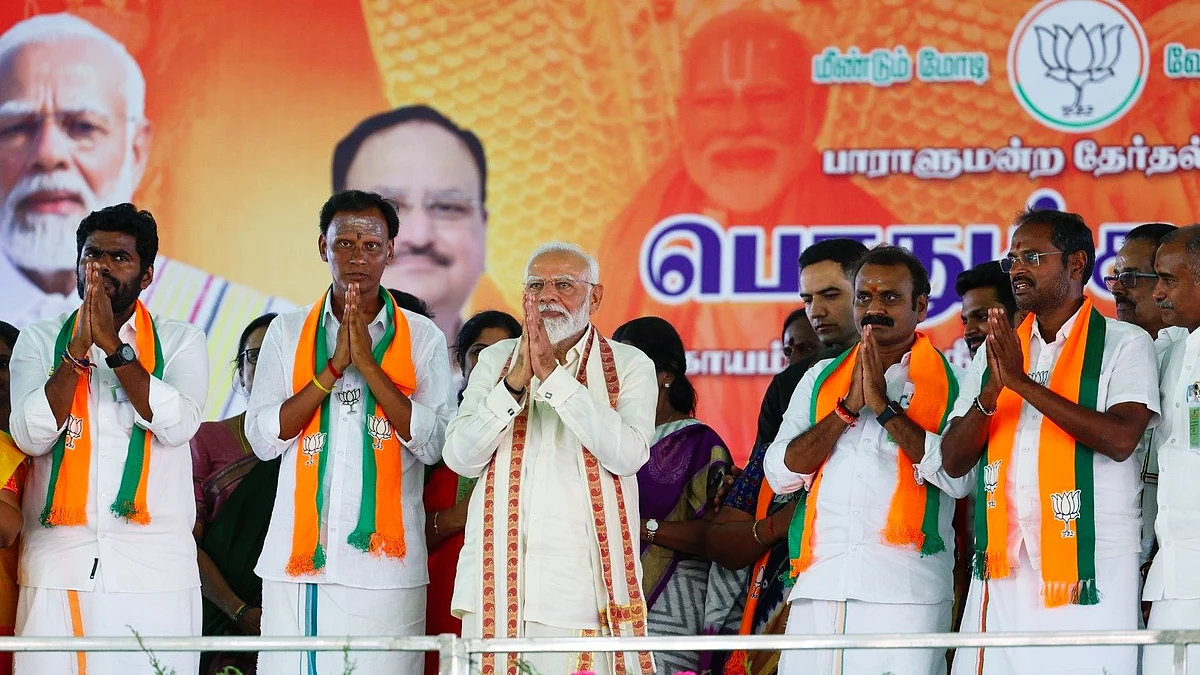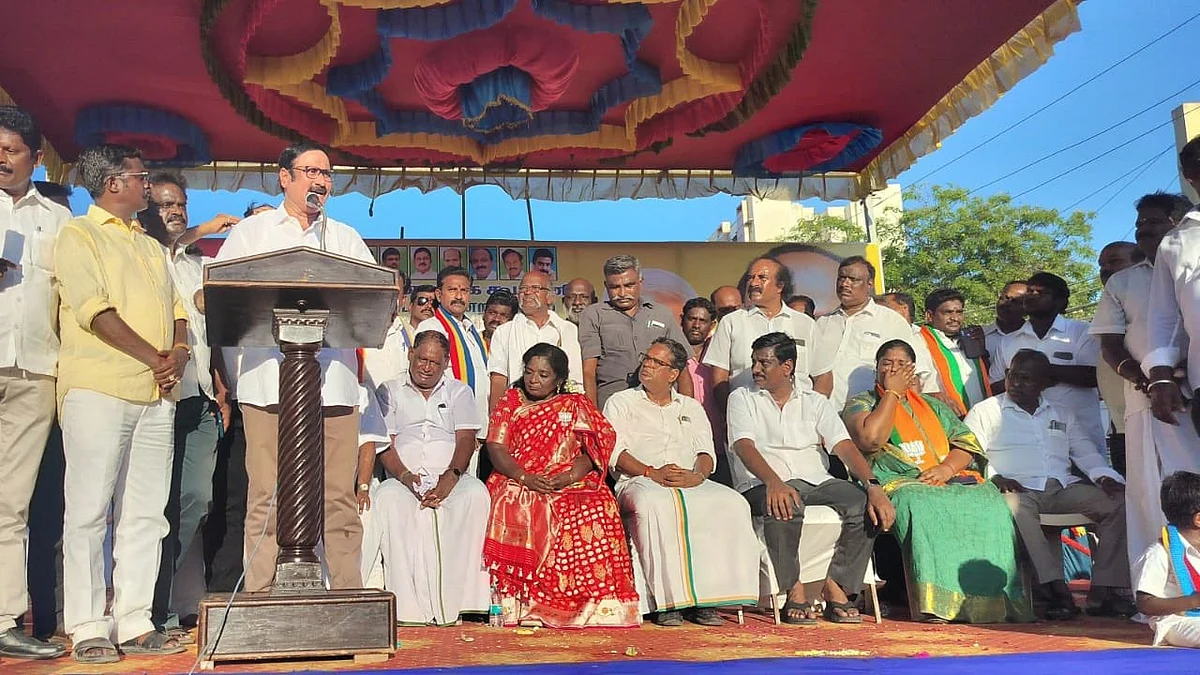Tamil Nadu: The logic-defying PMK-BJP alliance
The BJP gets an edge but the PMK gains nothing — why would it sacrifice itself?

The Dravida Munnetra Kazhagam (DMK) calls it “mysterious”, while the All India Anna Dravida Munnetra Kazhagam (AIADMK) says it is a "breach of trust". Political watchers find it baffling, and the rank and file of the party are dismayed. The issue that has got all tongues wagging is the Pattali Makkal Katchi (PMK) partnering with the Bharatiya Janata Party (BJP) in Tamil Nadu for the Lok Sabha election.
By all accounts, the PMK decided at the last minute to join the BJP’s ragtag alliance of political sundries in Tamil Nadu, even as the AIADMK, the main opposition party in the state now, kept its doors open for its erstwhile partner to join the alliance it leads. The PMK was in the AIADMK alliance for the 2019 Lok Sabha election and also for the 2021 Assembly election; its other partners were the Desiya Murpokku Dravida Kazhagam (DMDK) and the BJP.
The PMK’s decision, more perplexing than surprising, generated a lot of speculation and intense debate. The PMK has been known to switch between the two major Dravidian parties and its political opportunism has also seen it joining the BJP-led NDA for the 2014 Lok Sabha election, along with the DMDK and Vaiko’s Marumalarchi Dravida Munnetra Kazhagam (MDMK).
Jayalalithaa won the 2014 election on the ‘Modi or Lady’ slogan, with the AIADMK winning 37 of the state's 39 seats. Dr Anbumani Ramadoss, son of PMK founder Dr S. Ramadoss, successfully contested from the Dharmapuri constituency. He lost the seat in 2019; his wife Soumiya is its candidate this time.
BJP alliances in Tamil Nadu
In Tamil Nadu, the BJP is largely perceived as anti-Tamil Nadu, anti-Tamil and anti-minorities. The party’s ‘one nation, one language, one culture’ agenda makes the electorate uneasy. Despite cosying up to the saffron party in the aftermath of its leader Jayalalitha’s death, the reason the AIADMK dropped the BJP from its alliance before the election was a very basic one: it would have meant a heavy erosion of minority and Dalit votes.

In the midst of the gloomy prospects that this break entailed for the BJP’s ‘400 paar’ dream, for which winning seats in the South is vital, in walked the PMK. It spread cheer among BJP supporters as they eyed a bonanza in the northern districts, where the PMK is strong.
But what led the PMK high command to suddenly change their mind, when even mainstream parties are unwilling to ally with the BJP? Was it more compulsion than choice for the PMK in Tamil Nadu’s caste-centric turf, where the party does wield considerable electoral clout?
The PMK’s strength has been its caste mobilisation in the northern districts where the Vanniyars, part of the most backward caste (MBC) list, are predominant. This in turn prompts parties like the DMK and the AIADMK to try to keep the party on their side.
On the flip side, the PMK, which began as a caste-based outfit in the 1970s and then bloomed into a regional player in the 1980s, lacks a pan-Tamil Nadu presence and has to ally with a major party for political relevance. The PMK’s vote share has consistently been around 5 per cent, irrespective of whether the alliance it is in wins or loses. The BJP’s vote share has remained at around 4 per cent. The AIADMK, despite all its internal troubles, has maintained a 35 per cent vote share in all elections.
The BJP today depends on its own social media predictions about its growth in Tamil Nadu. The party’s state unit president K. Annamalai and his team believe that the party will get around 18 per cent of the votes; but in the absence of any solid data or analysis, this is just a number built on hope. The question, therefore, arises: why did the PMK leadership gamble on allying with a party that is yet to show credible performance in the state?
To win in Tamil Nadu, any alliance needs to have a vote share of more than 40 per cent. The DMK alliance won the 2021 Assembly election with a vote share of 45.38 per cent, against the AIADMK’s 38.17 per cent. In the 2019 Lok Sabha election, the DMK alliance won 38 of 39 seats, with 53.15 per cent of the votes against the AIADMK’s 30.57 per cent. That was the lone seat the AIADMK won.
The BJP claims to be stronger this time, based on its past performances in Coimbatore, Kanyakumari, and Ramanathapuram, while the PMK lacks any support outside the northern districts. Thus, while the BJP may get a boost in its vote share because of the PMK, the latter gains no significant benefit or advantage by being in the alliance.
Despite being a recognised regional party with a dedicated symbol, the PMK has a lower vote share than actor-turned-politician Seeman’s Naam Tamilar Katchi (NTK), which usually musters around 8 per cent of the vote share across Tamil Nadu. But the PMK’s advantage is its ‘concentrated presence’ in the northern districts, which have nearly 90 of the 234 seats in the state Assembly.
This unique caste-oriented primacy gives it an edge that makes it important for any alliance. Meanwhile, the NTK, for reasons best known to itself, prefers to fight alone, shunning alliances. In fact, the BJP now covets the space the NTK occupies in Tamil Nadu politics, and is eyeing the latter’s 8 per cent vote share.
The PMK leadership has yet to give a credible explanation for their decision to dump the AIADMK. At a press conference, Anbumani Ramadoss claimed that they had to part with the AIADMK since the party had not heeded their plea for a 10.5 per cent reservation for Vanniyars within the MBC quota.
He said the then-chief minister, Edappadi K. Palaniswami, had passed a law at the last minute. “Now it is entangled in legal issues. Besides, the alliance with the AIADMK in 2019 and 2021 did not benefit the PMK. While our votes were transferred to the AIADMK and other partners, their votes were not transferred to the PMK. It is treason,” he said.
The justification has cut little ice within the party cadre. Suresh, an ardent PMK supporter and a worker in the imitation jewellery industry in Chidambaram, says many of his party colleagues are unhappy with the leadership’s decision to align with the BJP.
“Had the party returned to the AIADMK alliance, the fight against the DMK front would have been close. Now, it is between the VCK and the AIADMK,” he said. (The Viduthalai Chiruthaigal Katchi leader Thol Thirumavalavan is the DMK alliance candidate in Chidambaram, a reserved constituency.) Many in the PMK echo his views.
While the BJP likes to believe that it will get an 18 per cent vote share in the state, it has no study or science to back this belief. Neither does the PMK trust such inflated numbers. It does, however, take comfort in developments elsewhere in the country in favour of the BJP, and apparently hopes the PMK too will benefit from it.
The BJP has struggled to find candidates to field in this election. It wanted known faces, so it made Tamilisai Soundararajan resign as governor of Telangana and Puducherry and contest from South Chennai. It asked L. Murugan, minister of state and Rajya Sabha MP from Madhya Pradesh, to contest from the Nilgiris reserved constituency. It fielded its Tamil Nadu Assembly floor leader and MLA Nainar Nagendran in Tirunelveli.
State party president Annamalai, who famously insisted that he preferred not to contest but tour the state, was pressed into service in Coimbatore. Yesteryears actor Radhika Sarathkumar, educationist A.C. Shanmugan and media baron and industrialist Parivendhar are the BJP’s other candidates. John Pandian, a Dalit leader and founder of the Tamizhaga Makkal Munnetra Kazhagam, is also an alliance candidate. The Tamil Nadu unit of the BJP believes these faces can match the might of the Dravidian parties.
While identity politics has certainly helped the party, its decision this time means that all 10 PMK candidates seem like sacrificial lambs offered at the altar of the politics of opportunism. It remains a mystifying choice.
Article courtesy: Frontline
Follow us on: Facebook, Twitter, Google News, Instagram
Join our official telegram channel (@nationalherald) and stay updated with the latest headlines
